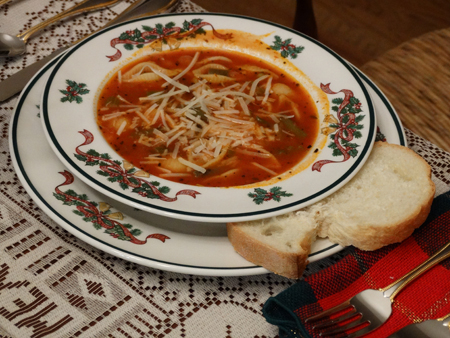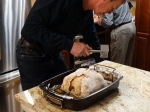 I get this Christmas article done just under the wire: today is the last day of the “Twelve Days of Christmas.”
I get this Christmas article done just under the wire: today is the last day of the “Twelve Days of Christmas.”
Today, January 6th, is known as “Little Christmas” or (in Irish) “Nollaig na mBan” otherwise know as “The Feast of the Epiphany” when the wise men, according to tradition, gave the gifts of gold, frankincense, and myrrh to the Christ-child. It is also the day, James Joyce used to place in time one of my favorite short stories, “The Dead.”
It is quite appropriate that I should publish this on “Little Christmas” as it concerns the Christmas dinner I made for my family, which I called “Little Night.”  For a while now, I have been promising a “Big Night” for my folks. This is a dinner based after one of my most favorite foodie films of that name. The film features some of the most amazing Italian food in cinema, and my idea is to make a number of dishes from the film to serve after my family seeing the film. Christmas, of course, has too much going on to devote all that time to cooking, so I thought I would give my family a scaled-down version to whet their appetite…hence, “Little Night.”
For a while now, I have been promising a “Big Night” for my folks. This is a dinner based after one of my most favorite foodie films of that name. The film features some of the most amazing Italian food in cinema, and my idea is to make a number of dishes from the film to serve after my family seeing the film. Christmas, of course, has too much going on to devote all that time to cooking, so I thought I would give my family a scaled-down version to whet their appetite…hence, “Little Night.”
One of our family traditions for some time was developed when, years ago, I made Minestrone Soup at Christmas and it was a universal hit. Even the guys who won’t eat veggies (…and you know who are…Stephen Swasey…oh, did I just type that?!!!) liked it. A tattered copy of my recipe has been hanging around for some time, and the actual dish has been duplicated so well by others, that I haven’t made it at Christmas for years now. Moo did an excellent job with this years’ batch. The rest of the meal was mine, ‘tho. We had:
Moo’s Minestrone Soup Chicken Roasted in Spiced Dough Bow Tie pasta with Greens Fancy Salad Tiramisu 
The chicken dish is called “Pollo al Sal” or chicken roasted in a salted dough. The dough spices the meat as it traps all the delicious moisture in. The dough bakes as the chicken roasts. At the end of cooking (dubbed the “chicken basketball” by the guys by virtue of how it looked) and after resting, you break the dough with a hammer and you have the most tender chicken of your life! We decided to substitute fresh herbs (rosemary, and thyme) instead of salt for a healthier, tastier chicken.
My next dish was a bit of a flop…this time. I usually make the bow tie pasta dish with broccoli raab, a slightly bitter veggie that looks like broccoli gone to seed. It sweetens very nicely when you saute it with garlic in olive oil and sweet red peppers. Trouble was…I couldn’t find broccoli raab anywhere, so I substituted dandelion greens instead. This ended up a little too bitter for most of my family’s taste. I also made the mistake of grilling the parmesan cheese which ended up hardening the pasta a bit. Microwave always has worked for me in the past. Lesson: stick to what works for the basic dishes.

My salad was nice with a center of lentils cooked in olive oil, garlic, tomatoes and spices. This was covered with exotic greens, matchsticked fennel, fresh mozzarella cheese, tomatoes, pomegranate seeds, clementine sections, all topped with a blood-orange olive oil and wine vinegar. The salad tasted very good, but I need to work on my salad-arranging skills for the next big meal.
My Tiramisu has been perfected over the years, and I love especially it near Christmas. When I found out that Nickki my niece liked it, I had to make it! Most recipes use beaten raw egg yolks. I cook mine with kaluha, beating all the while, to make zabaglion e, an Italian light custard, which I then cool before whipping in the marscapone (an Italian cream cheese.) I could not find espresso either, so I brewed a strong coffee and concentrated its brewing to get a good substitute. I also could not find spiced cocoa, so I made my own. Then, it’s all assembly: lightly dip lady fingers in the coffee, a layer of the custard, sprinkle of spiced cocoa, and shaved dark chocolate. Cover and chill. I save the top layer of chocolate shaving until just before serving.
e, an Italian light custard, which I then cool before whipping in the marscapone (an Italian cream cheese.) I could not find espresso either, so I brewed a strong coffee and concentrated its brewing to get a good substitute. I also could not find spiced cocoa, so I made my own. Then, it’s all assembly: lightly dip lady fingers in the coffee, a layer of the custard, sprinkle of spiced cocoa, and shaved dark chocolate. Cover and chill. I save the top layer of chocolate shaving until just before serving.  “Little Night” was my gift, but my family spoiled me rotten with gifts of their own, with the charming company of four lovely dogs, as well as their own sparkling personalities!
“Little Night” was my gift, but my family spoiled me rotten with gifts of their own, with the charming company of four lovely dogs, as well as their own sparkling personalities!
[Thanks to Stephen Swasey for all photos, except the one of the family (me) and the one of me and Sophie (Nickki)]



































